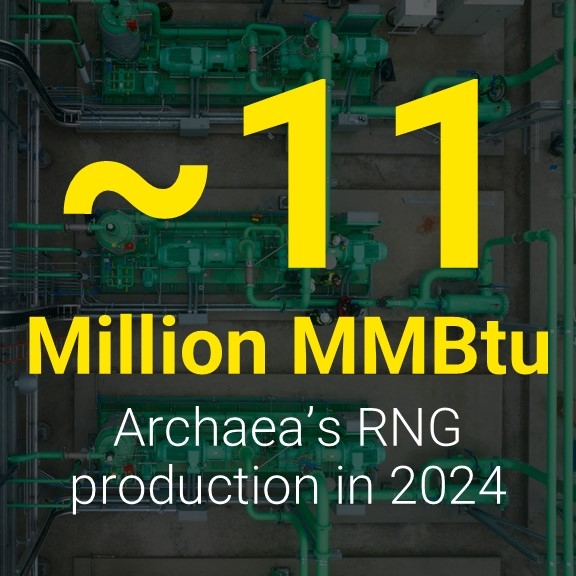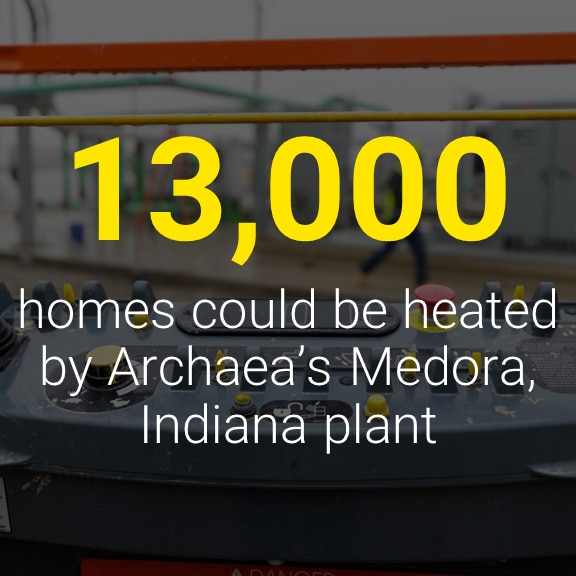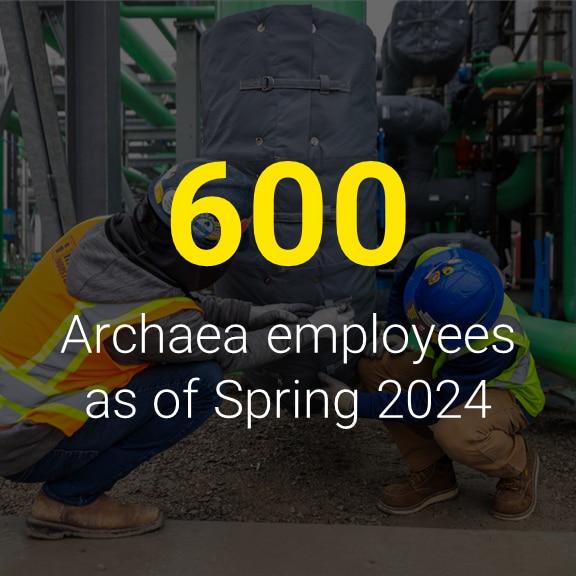How bp turns landfill waste into renewable natural gas
Among the waste decomposing at farms and landfills across the US, bp saw something it liked: an abundant source of energy, one that could provide the company with a new revenue stream and another way to help reduce greenhouse gas emissions.
bp had that concept in mind when it acquired Archaea Energy in 2022, adding a business that turns methane produced at private, municipal and agricultural waste sites into electricity and pipeline-ready renewable natural gas (RNG).
Archaea works with dairy farms and landfills across the country, converting waste gas directly into electricity or turning it into RNG.
The result of that work is energy – valuable, reliable and with lower lifecycle emissions than traditional fossil fuels.

By acquiring Archaea, bp immediately became America’s largest RNG producer, marking a milestone in the company’s efforts to rapidly expand its bioenergy business.
Last year, Archaea produced around 11 million MMBtus of RNG from its locations across the US. Outside Scranton, Pennsylvania, the business operates one of the highest-capacity RNG plants in the country, accepting about 22,500 standard cubic feet of landfill gas per minute for processing – enough fuel to heat nearly 92,000 homes annually, according to the US Environmental Protection Agency’s Landfill Gas to Energy calculator.
In many ways, Archaea is a vivid, tangible example of how bp has transformed into an integrated energy company. And just one of the many ways we supported over 300,000 U.S. jobs and contributed over $60 billion to the US economy last year.
With demand for RNG rising and US policies beginning to support growth of the sector, conditions are right for quickly delivering strong returns from bioenergy.
Beyond the positive financial and production impacts, bp sees potential to support its customers’ decarbonization goals and reduce the lifecycle carbon intensity of the energy it produces – part of the company’s ambition to become net zero by 2050 or sooner.
Here’s how bp turns waste into renewable natural gas:
1. Converting waste gas into RNG
Archaea partners with landfills and farms to capture natural emissions from their decomposing organic waste, which naturally releases biogas – a combination of methane and various impurities including carbon dioxide, nitrogen, and hydrogen sulfide.
Archaea’s RNG plants use vacuum pressure to gather those emissions, then remove the impurities and destroy them using thermal oxidizers, also known as thermal incinerators. They then compress the separated methane for transport as RNG to users through existing pipelines.
The removal of non-methane organic compounds during the cleaning and conditioning process can reduce odors and possible health risks.
2. Environmental benefits of producing RNG
The methane gas that escapes from decomposing organic waste is a potent greenhouse gas. According to the EPA, it has a global warming potential 28 times greater than carbon dioxide.
Reducing methane emissions can achieve significant near-term progress in mitigating global climate change. For facilities that are not already required to mitigate such emissions, an RNG project can reduce methane emissions substantially.
On the user side, combusting RNG emits carbon dioxide, which has less planet-warming potency compared to simply allowing the methane to flow into the atmosphere.
If used as replacement for traditional transportation fuels such as gasoline or diesel, RNG can have up to 95% lower carbon emissions, according to a US Department of Energy study. It can also improve air quality by reducing emissions of nitrogen oxides and particulate matter.
Last year, Archaea produced around 11 million MMBtus of RNG from landfills and farms across the country.



3. Extracting value from waste – and RNG
RNG is a pipeline-quality, low carbon fuel that is interchangeable with traditional natural gas. It can be used in a variety of ways, including:
- For power generation and heavy industry
- As a lower-carbon transportation fuel
- For heating homes and buildings
- To create liquefied natural gas or sustainable aviation fuel – one of bp’s growth engines
- As a feedstock for renewable hydrogen – another one of bp’s growth engines
Sources of biogas for RNG production include landfills, animal manure and wastewater treatment facilities. Landfills are the largest of these sources and produce methane reliably, making them an attractive feedstock for RNG.
That’s why Archaea is focusing largely on landfills in planning for rapid expansion.
4. Selling and distributing the RNG
Archaea sells the RNG it produces through long-term offtake agreements. It also has exclusive gas rights with landfill owners to ensure methane supply well into the future.
As with bp’s entire corporate strategy, integration between its businesses adds value.
bp’s sophisticated Supply, Trading & Shipping business, for example, provides a direct pathway for moving and selling Archaea’s RNG, electricity and renewable-energy credits to more than 5,000 North American customers.
Other bp growth engines such as EV charging and low-carbon hydrogen could provide future pathways for use of Archaea’s electricity and RNG, potentially increasing demand for both.
We're investing in America
Delivering the energy systems Americans - and the world - needs today and building tomorrow's.
How bp can quickly scale Archaea
Archaea’s growth will be helped by installing “off-the-shelf” production plants at the sites in its deep project pipeline. Its unique platform, known as the Archaea Modular Design, streamlines the time it takes to construct RNG plants, which are traditionally custom-built. Archaea can place modular units on skids with interchangeable components for faster development.
In 2023, Archaea tested its modular platform in Medora, Indiana, where the business that year installed a new RNG plant near a waste and recycling landfill.
The plant can process 3,200 cubic feet of landfill gas per minute into RNG – enough to heat about 13,000 homes annually, according to the EPA’s Landfill Gas Energy Benefits Calculator.
RNG spells jobs
Archaea directly employs more than 600 people across the US, typically hiring local people to run day-to-day operations. By the end of 2025, the business expects to add more than 100 additional workers as it expands to new locations.
Archaea’s RNG facilities also support neighboring industries, including construction, engineering, equipment vendors and utilities.